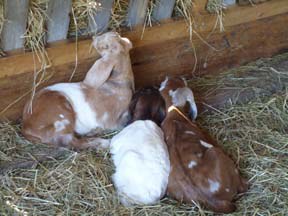BLAIR COUNTY: Goats, Value-added Products
Beth Futrick at Cherry Hill Farm started her goat operation four years ago with just two goats. Her original plan was to have the goats clear multiflora rose, autumn olive, and honeysuckle that covered the pastures behind her house where her grandparents had once raised cattle. She subsequently got two more does and a buck. After the first set of babies, Futrick decided to get a registered Boer buck. She now has 34 goats, and they have cleared all the invasive species from the original pasture and will now be moving into a neighboring pasture.
Beyond pasture maintenance, Futrick is focused on building up the herd for three potential markets. First, she sells small quantities of meat with plans to continue and expand this operation. Second, she is trying to get the herd to 100% Boer in order to sell it for breeding stock. Finally, Futrick plans to milk some of the goats during the spring and freeze the milk to use for soapmaking.
Futrick is not interested in dairy milk production. Although she says she gets a lot of people stopping by the farm asking for goat milk, she doesn't want to get involved in complying with all the regulations to sell milk. Furthermore, after spending the day at her job as a Blair County Conservation District Agricultural Liaison, she often doesn't have time for milking. However, she sees soapmaking as a good opportunity because it requires very little milk, which can be produced seasonally. Her main goal is still to sell meat and breeding stock. She knows from her work with farmers that there will be an increasing demand for goat meat, and Boer goats tend to be meatier and demand a higher price. Thus, Futrick sees soap as an extra value-added product that she can incorporate into her existing operation.
Another valuable product that the goats produce is manure for her gardens. Futrick's manure management plan is to spread the manure on her vegetable and perennial beds in the spring. In the winter the goats stay in the barn on a deep bedding pack. She cleans the barn and spreads the manure in the spring and summer after the goats have gone out to graze in the pastures. (Futrick notes that developing a manure management plan--even something as simple as hers--is required under Pennsylvania's new Clean Streams Law. Chapter 91, which is currently under review, requires anyone collecting any amount of manure to have a manure
management plan. Farmers can write their own plans. Chapter 102 Erosion and Settlement Control, in effect since November 2010, requires every farm that disturbs more than 5,000 square feet of land, whether tilled or no-till, to have an erosion control plan or conservation plan to prevent erosion and sedimentation. In addition, heavy animal use areas over 5,000 square feet must also develop an Ag Erosion and Sediment Control Plan.)
Beth Futrick was recently elected to the PA-WAgN Steering Committee. Futrick--who serves as an Agricultural Ombudsman for the Pennsylvania department of Agriculture and also works at the Blair County Conservation District--says she got involved with WAgN for professional reasons even before she began farming. She now sees the organization as both a professional and a personal resource, particularly for help with marketing and value-added enterprises.
Pennsylvania Women's Agricultural Network
Address
302 Armsby BuildingUniversity Park, PA 16802
- Email pawagn@psu.edu
Pennsylvania Women's Agricultural Network
Address
302 Armsby BuildingUniversity Park, PA 16802
- Email pawagn@psu.edu


